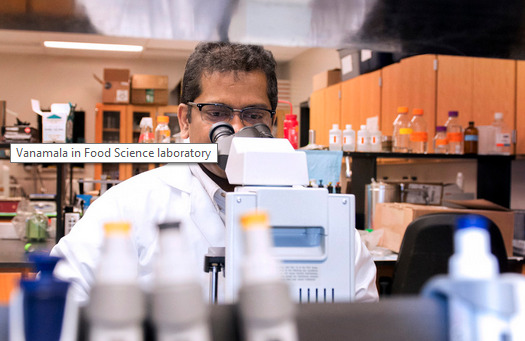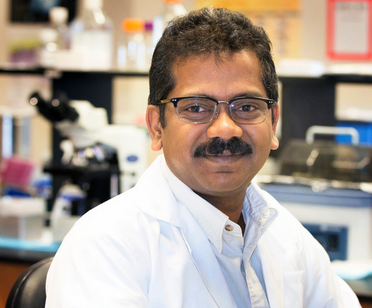BTN.com staff, May 30, 2015

Inspired by their experiences in college and elsewhere, these Pathfinders are passing by the typical, well-trod career paths and blazing their own trails. We?ll explore the unconventional approaches these Big Ten alums are taking to work.
 Penn State professor Jairam KP Vanamala grew up in a place where there was no 9-1-1 and very little in the way of emergency services.
Penn State professor Jairam KP Vanamala grew up in a place where there was no 9-1-1 and very little in the way of emergency services.
His village in southern India, while idyllic, was so remote that the nearest health facility was more than 40 miles away. If you got sick or injured, you had to cross a river and go over a mountain.
But here?s the curious thing: The majority of the people who lived there thrived.
?As a kid, we had at least seven to eight greens a day from the local sources,? he said. ?Everyone ate this way. As a boy, I would wander those fruit and vegetable fields. The food sources were passed from generation to generation. Our lifestyle was our medicine.?
Today, many thousands of miles away from his roots, Vanamala is working at Penn State as an associate professor in the Department of Food Science and a faculty member at The Penn State Hershey Cancer Institute, helping others find good health by linking food with disease prevention. (He?s also on the faculty of Center for Molecular Immunology and Infectious Diseases at Penn.)
To do that, he?s combining the ancient field of Ayurvedic medicine with modern technology to figure out how certain diets fight cancer, along with other debilitating and deadly diseases. Consequently, Vanamala must look backward and forward at the same time.
?There is so much ancient wisdom accumulated that we can combine with our advanced technology to test what?s true and not true in the context of cancer and disease prevention,? he said. ?The goal is to embrace what?s true and lower disease rates.
?What we?ve learned is that diet plays a very critical role in either promoting or preventing cancer. The good news is that, more than ever before, people are aware of what they are eating. They know about nutrients. Now, they need to know what food can actually do or not do for them.?
Soaring cancer rates are particularly alarming, he added.
?We have to combat this cancer epidemic,? Vanamala said. ?It?s a very painful disease for the entire family. Quite often, my students share with me that a member of their own family has cancer. I even had a 25-year-old student who was diagnosed with colon cancer.
?We have the modern ability to understand what types of foods promote inflammation. We can utilize foods for chronic-disease prevention.?
Modern methodologies have also given him the chance to study proteins in a new way.
?In the past, we used to track one or two proteins, which made it difficult to come up with conclusions,? Vanamala explained. ?With technology, we can now track thousands of proteins in mammals and humans. The end result is we have a much better look at what?s going on and how it?s impacting human health.?
He is quick to add that there are factors besides diet, such as family history, that can cause cancer.
?What you can still do is feed yourself the right nutrients,? he said. ?That will help you profoundly.?
All of this begs the question: How can one start a disease-fighting diet today?
?The two key things that are time-tested truths are moderation and variety,? Vanamala says. ?The bottom line is that eating fruits and vegetables and incorporating exercise into your day makes a tremendous difference in human health.?
The professor recommends starting with locally grown fruits and vegetables from farms or a farmer?s market.
?When we source local vegetables, there are no preservatives,? he said. ?It?s the freshest food possible. You?re eating the healthiest foods to prevent inflammation. We are learning that inflammation is key for a disease to progress.?
He added that it?s important to eat a ?rainbow? of colors daily.
?Incorporate as many colors as possible to get your phytonutrients,? he said.
Oh, and never skip breakfast.
?The body goes through different cycles daily where it needs foods and then sheds toxins - that?s why eating in the morning is so important,? said Vanamala, who was happy to share his own favorite breakfast. ?The best breakfast is fruit, yogurt and leafy greens. You can mix them in a smoothie. You also need those probiotics in the yogurt for good gut health.?
Lunch and dinner can be a combination of lean proteins with herbs, spices and vegetables.
?Combine a lean protein with ginger or garlic like they did in ancient cultures,? Vanamala recommended. ?Use locally sourced herbs. When you add herbs, it helps with the digestion of the meat. For example, there are 11 different spices in Indian curry that go with the chicken. Those spices help the body digest and detoxify. When you put garlic and onion on your broccoli, you?re also helping your body in the same way.?
He?s not a big believer in snacking.
?Don?t eat if you?re not hungry. But you do need to feed your body when you do feel natural hunger.?
Also, try to be mindful of sugar intake, particularly as this substance is often ?hidden? in food.
?Get rid of those foods and reduce refined sugars as much as possible,? he said.
As for fluids, he recommended returning to the ancient ways by adding flavoring to water to increase hydration. Vanamala uses locally sourced honey as a sweetener.
[btn-post-package]?For generations, people drank water with lemon and honey in it,? he said. ?Remind yourself that if anything flavors your water, it should be available from a local, natural source and not chemicals. It is crucial to hydrate. Our body rids itself of toxins by elimination. And 65 percent of our body is water. I don?t care if it?s cold or warm water. Just hydrate the body.?
Finally, though it?s not quite in the dietary realm, he also recommends frequent, regular exercise. To that end, he does strength training twice a week, swims and walks around the campus at State College, Pa.
?There is a beautiful arboretum at Penn State, and I like to go for a walk to relax,? Vanamala said. ?Penn State is a wonderful location and a great community. I?m really enjoying my time here.?
By Cindy Pearlman







